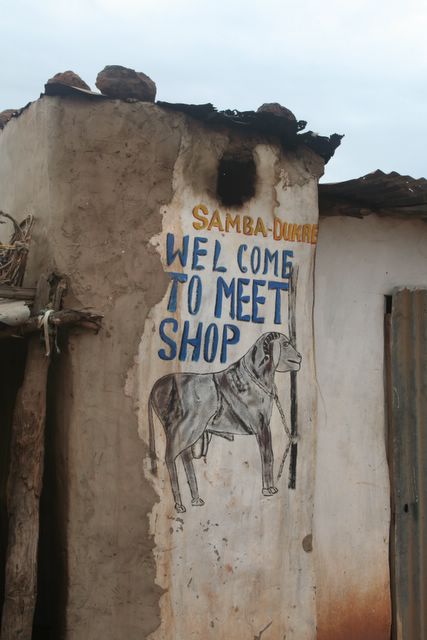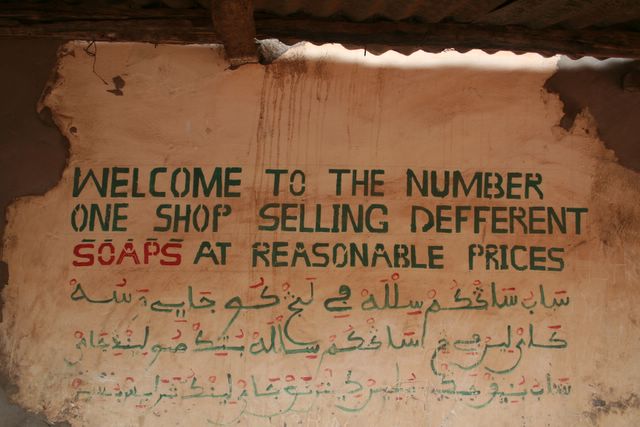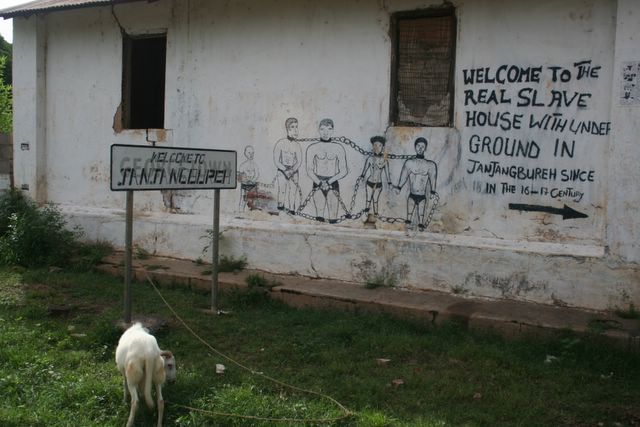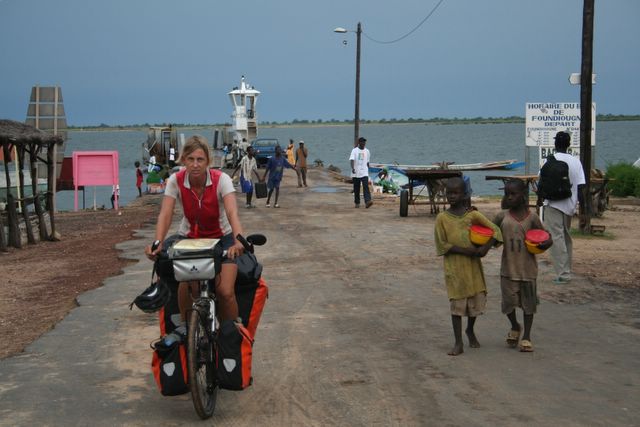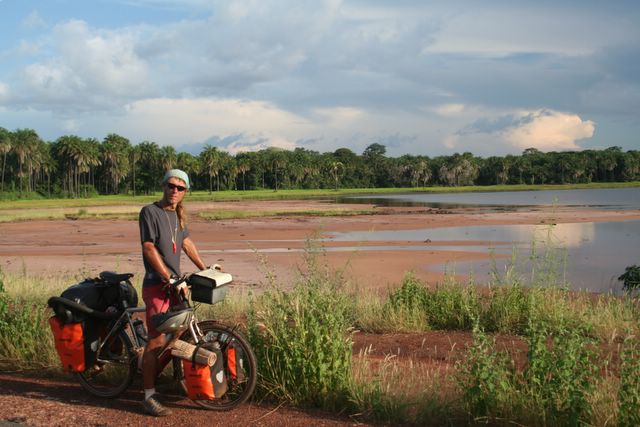update 7.
welcome to africa!
12 October, 2006
Nouakchott, Mauritania to Ziguinchor, Senegal via The Gambia
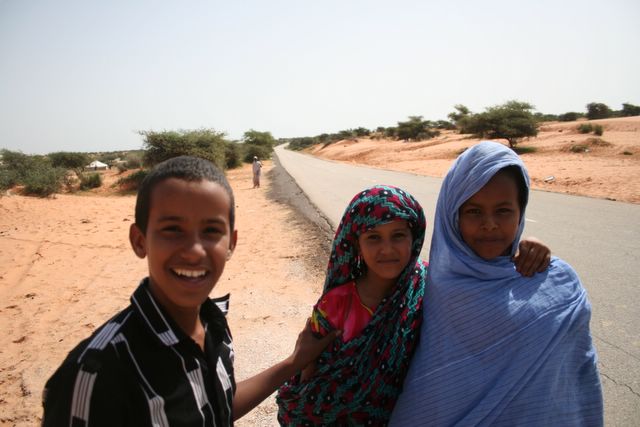 Heading
south from the Mauritanian capital in mid September the desert
gradually gave way to dry savanna and bush and as we neared the
Senegal border the countryside took on an ever more tropical feel.
After the solitude of the Sahara, passing the simple compounds of
mud-brick huts and watching the daily goings-on of the villagers was a
welcome distraction. As the afternoon temperature rose, groups
gathered for a chat or a snooze under shady trees and many called out
to us to come and have a rest. Having an entirely different
conception of time and urgency, they were clearly baffled when we
politely declined their offers, explaining our rush to reach the border.
Heading
south from the Mauritanian capital in mid September the desert
gradually gave way to dry savanna and bush and as we neared the
Senegal border the countryside took on an ever more tropical feel.
After the solitude of the Sahara, passing the simple compounds of
mud-brick huts and watching the daily goings-on of the villagers was a
welcome distraction. As the afternoon temperature rose, groups
gathered for a chat or a snooze under shady trees and many called out
to us to come and have a rest. Having an entirely different
conception of time and urgency, they were clearly baffled when we
politely declined their offers, explaining our rush to reach the border. 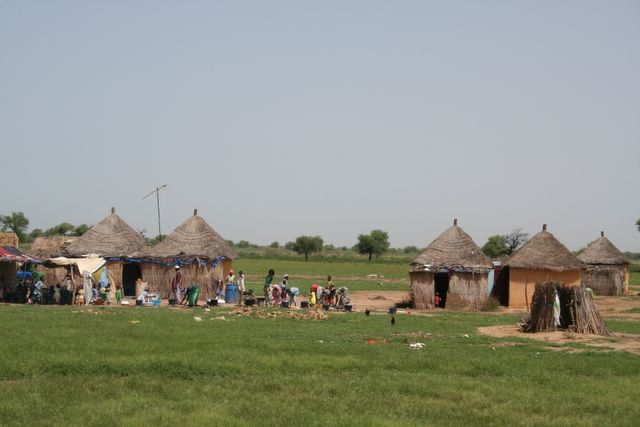 We arrived in the frontier town of Rosso just as the sun was setting
and perhaps it was just as well since the dimness masked some of the
town's squalor and filth. Border towns are often dodgy places full of
shady characters looking to make a quick buck on black market goods or
dubious deals changing money, and Rosso was no exception. The
immigration office having closed down for the day, we took a room in
the town's tourist class hotel after Amaya turned her nose up at the
budget accommodation which offered a dingy room with a couple of bare
mattresses on the floor, leaky plumbing and the distinct oder of greasy
food wafting up from the eatery below. Cost cutting has its limits.
We arrived in the frontier town of Rosso just as the sun was setting
and perhaps it was just as well since the dimness masked some of the
town's squalor and filth. Border towns are often dodgy places full of
shady characters looking to make a quick buck on black market goods or
dubious deals changing money, and Rosso was no exception. The
immigration office having closed down for the day, we took a room in
the town's tourist class hotel after Amaya turned her nose up at the
budget accommodation which offered a dingy room with a couple of bare
mattresses on the floor, leaky plumbing and the distinct oder of greasy
food wafting up from the eatery below. Cost cutting has its limits. Crossing the border proved trying. After being allowed behind the port barricade a uniformed official snatched our passports and disappeared without a word. We were herded on to the overcrowded ferry and wedged in between the vehicles, still wondering what had happened to the immigration agent. He appeared sometime later and demanded 20 euros for the 'formalities'. We had no intention of contributing to corruption, so under the guise of just wanting to have a look at the exit stamps, Amaya snatched back the passports and quickly hid them safely in her money belt. Seeing his chances for a hefty bribe greatly diminished, the official became livid and insisted we disembark immediately. We ignored his clamors and eventually he gave up insisting we pay the formality fee, surely sensing our resolve not to part with any of our cash.
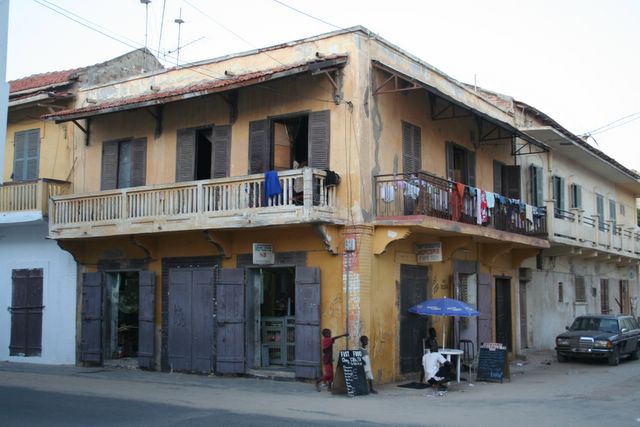 Once
across the border a quiet backroad meandered through lush countryside
dotted with acacia trees and in each village we passed we were greeted
with enthusiastic shouts of 'Toubab', as whites are referred to in
these parts. We weren't used to causing such a stir and by the
end of the day we were hoarse, having tried to match the locals'
exuberant greetings village after village in a fairly heavily populated
area. Our first stop in Senegal was the former French capital,
St. Louis. The houses are crumbling but the town still has a bit
of flair and the surrounding wetlands made for a pleasant enough
excursion. We ended up spending several days in St.Louis waiting
for the customs agent at the post office to return from his holiday, so
the backlog of parcels could be inspected and we could finally pick up
our long-awaited package containing new tires. Patience folks,
this is Africa!
Once
across the border a quiet backroad meandered through lush countryside
dotted with acacia trees and in each village we passed we were greeted
with enthusiastic shouts of 'Toubab', as whites are referred to in
these parts. We weren't used to causing such a stir and by the
end of the day we were hoarse, having tried to match the locals'
exuberant greetings village after village in a fairly heavily populated
area. Our first stop in Senegal was the former French capital,
St. Louis. The houses are crumbling but the town still has a bit
of flair and the surrounding wetlands made for a pleasant enough
excursion. We ended up spending several days in St.Louis waiting
for the customs agent at the post office to return from his holiday, so
the backlog of parcels could be inspected and we could finally pick up
our long-awaited package containing new tires. Patience folks,
this is Africa!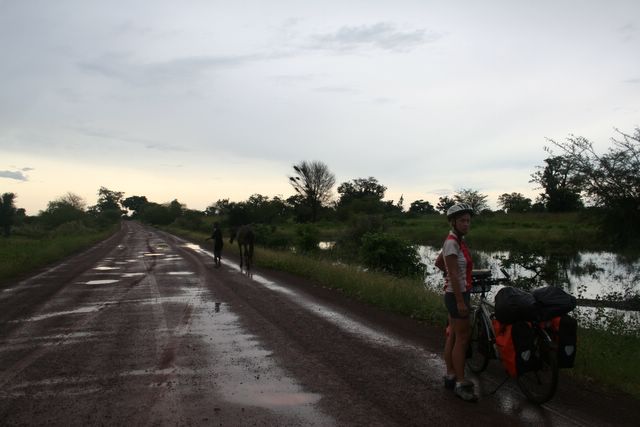 Dreaded Dakar, notorious for congested roads, pushy street
vendors and oppressive heat, was our next stop. In fact, we would
gladly have avoided the capital entirely, but a need to pick up a
visa for The Gambia necessitated a visit. We made the best of
things and chose to stay in the nearby fishing village of Yof rather
than in the heart of one of West Africa's mega-cities. From the
terrace of the guesthouse we watched the sunrise over the Atlantic and
peered down at the hustle and bustle as the fisherman set off in their
motorized pirogues. Late afternoon the beach was again abuzz with
activity as the men returned with the daily catch, fishmongers
vied for customers and boys tossed around a soccer ball among the stout
women gutting the tuna and barracudas. This being the month of
Ramadan, and the region being predominately Muslim, fasting is the norm
for most people from sunrise to sunset. Restaurants are open but
we're often the only customers and invariably the only thing on
offer is Chep-bu-jen--fish and rice. Delicious the first 20 times, but after that a bit monotonous.
Dreaded Dakar, notorious for congested roads, pushy street
vendors and oppressive heat, was our next stop. In fact, we would
gladly have avoided the capital entirely, but a need to pick up a
visa for The Gambia necessitated a visit. We made the best of
things and chose to stay in the nearby fishing village of Yof rather
than in the heart of one of West Africa's mega-cities. From the
terrace of the guesthouse we watched the sunrise over the Atlantic and
peered down at the hustle and bustle as the fisherman set off in their
motorized pirogues. Late afternoon the beach was again abuzz with
activity as the men returned with the daily catch, fishmongers
vied for customers and boys tossed around a soccer ball among the stout
women gutting the tuna and barracudas. This being the month of
Ramadan, and the region being predominately Muslim, fasting is the norm
for most people from sunrise to sunset. Restaurants are open but
we're often the only customers and invariably the only thing on
offer is Chep-bu-jen--fish and rice. Delicious the first 20 times, but after that a bit monotonous.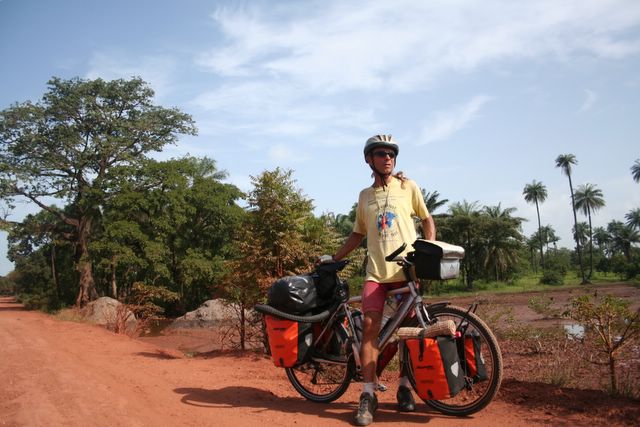 The
Gambia, just over 300 kilometers in length and never more than 50
kilometers from north to south, slices through Senegal and takes its
name from the river it surrounds. This tiny English-speaking
country is a popular destination with British package tourists escaping
the drab winter back home. If you confined yourself to the 10
kilometer beach strip where the hotels, restaurants and bars are all
congregated, you would certainly have the impression that the country
was fairly well-off. Venture further inland and another side
of Gambia unfolds. The country is poor, even by African
standards and the people are struggling to make ends meet. Basic
goods are not cheap and there's little on offer in the local markets--
sweet potatoes sold in piles of three or four, a few onions, some
okra and perhaps an over-priced aubergine or two if you're lucky.
Pasta is sold in minuscule quantities, the smallest bag can't be
more than 25 grams. Even bananas are
The
Gambia, just over 300 kilometers in length and never more than 50
kilometers from north to south, slices through Senegal and takes its
name from the river it surrounds. This tiny English-speaking
country is a popular destination with British package tourists escaping
the drab winter back home. If you confined yourself to the 10
kilometer beach strip where the hotels, restaurants and bars are all
congregated, you would certainly have the impression that the country
was fairly well-off. Venture further inland and another side
of Gambia unfolds. The country is poor, even by African
standards and the people are struggling to make ends meet. Basic
goods are not cheap and there's little on offer in the local markets--
sweet potatoes sold in piles of three or four, a few onions, some
okra and perhaps an over-priced aubergine or two if you're lucky.
Pasta is sold in minuscule quantities, the smallest bag can't be
more than 25 grams. Even bananas are 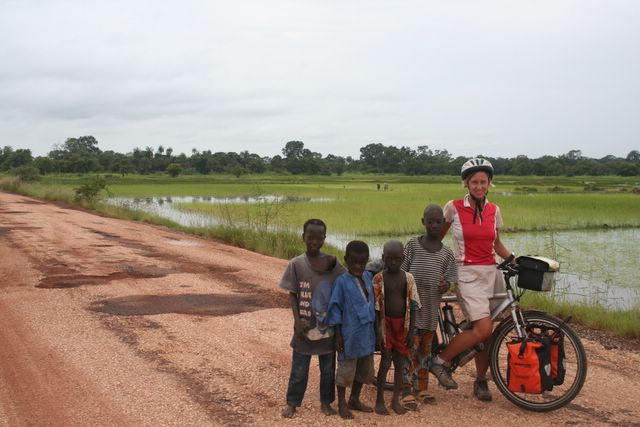 sometimes
hard to come by.
Amadou, a newly-qualified and highly-motivated teacher who
invited us to have a rest and a look at his school, can barely get by
on his monthly salary of 1,800 Dalasis (approx. 50 euros) and farmers
find it hard to pay for goods such as soap, gas and cooking oil.
On a more positive note, school fees for girls have been
abolished which means education is now more accessible than ever for
females in the country. NGOs abound, new schools are being
constructed and safe drinking water is readily available from the town pump or well even in the smallest of
villages.
sometimes
hard to come by.
Amadou, a newly-qualified and highly-motivated teacher who
invited us to have a rest and a look at his school, can barely get by
on his monthly salary of 1,800 Dalasis (approx. 50 euros) and farmers
find it hard to pay for goods such as soap, gas and cooking oil.
On a more positive note, school fees for girls have been
abolished which means education is now more accessible than ever for
females in the country. NGOs abound, new schools are being
constructed and safe drinking water is readily available from the town pump or well even in the smallest of
villages.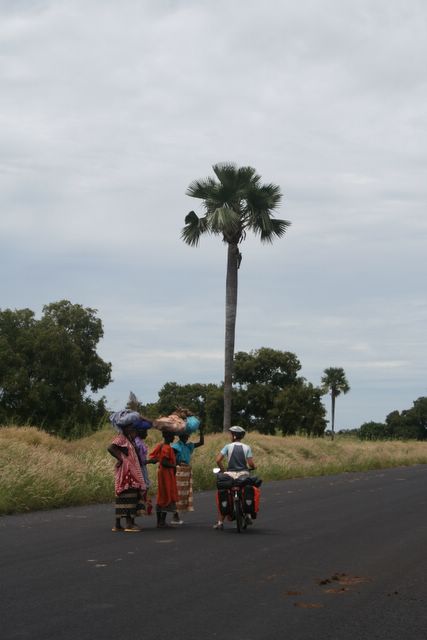 Cycling the south bank road we attracted the usual swarms of youngsters
waving wildly after the toubabs and
hoping for some handouts--money being top on the wish list.
Riding along dodging the potholes also turned out to be a good
way to
get to know Gambians as the roads are busy with children on their way
to school, groups of women filing past balancing loads of wood or
buckets of water on their head, and men going off to work.
We got a first hand glimpse of life in the countryside when the
head of a roadside village invited us to spend the night in his
compound. The chief is a man of 80 who lives with his extended
family--about 100 people in all we were told--in a series of mud-brick
dwellings surrounding a central courtyard. There was a flurry of
activity upon our arrival as the men concurred as to where to lodge us,
children scurried off to fetch buckets of water and the women rushed
about rustling up a meal for us. The villagers were truly
hospitable and we were mighty thankful for a roof over our heads when a
violent storm broke out in the wee hours of the morning. The next
evening we were again saved from a wet night in the tent (no hotels in
the vicinity) when a schoolboy, Moutar, invited us to stay with his
family. Their compound was simple and lacked the few 'luxuries'
of the chief's. There was no radio or kerosene lamp and the
children were running around in rags. Nevertheless, the family
had somehow found the money to pay Moutar's school fees, there was
abundant rice and fish and lots of laughter.
Cycling the south bank road we attracted the usual swarms of youngsters
waving wildly after the toubabs and
hoping for some handouts--money being top on the wish list.
Riding along dodging the potholes also turned out to be a good
way to
get to know Gambians as the roads are busy with children on their way
to school, groups of women filing past balancing loads of wood or
buckets of water on their head, and men going off to work.
We got a first hand glimpse of life in the countryside when the
head of a roadside village invited us to spend the night in his
compound. The chief is a man of 80 who lives with his extended
family--about 100 people in all we were told--in a series of mud-brick
dwellings surrounding a central courtyard. There was a flurry of
activity upon our arrival as the men concurred as to where to lodge us,
children scurried off to fetch buckets of water and the women rushed
about rustling up a meal for us. The villagers were truly
hospitable and we were mighty thankful for a roof over our heads when a
violent storm broke out in the wee hours of the morning. The next
evening we were again saved from a wet night in the tent (no hotels in
the vicinity) when a schoolboy, Moutar, invited us to stay with his
family. Their compound was simple and lacked the few 'luxuries'
of the chief's. There was no radio or kerosene lamp and the
children were running around in rags. Nevertheless, the family
had somehow found the money to pay Moutar's school fees, there was
abundant rice and fish and lots of laughter. 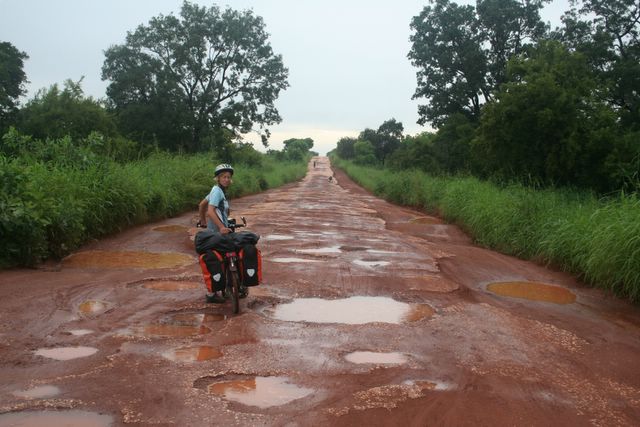 After
our tour of The Gambia, we crossed back into Senegal and the
picturesque, but troubled Casamance region. Humidity was high and the
tension palpable as we cycled through the forests of hardwood trees and
past emerald green rice fields to reach Ziguinchor. Once Senegal's
leading tourist area, rebel activity and sporadic fighting have
kept visitors away in recent years. We were told the area is calm
at the moment, but truckloads of nervous-looking soldiers poised for
action and tanks rolling past put us off from exploring the backroads.
After
our tour of The Gambia, we crossed back into Senegal and the
picturesque, but troubled Casamance region. Humidity was high and the
tension palpable as we cycled through the forests of hardwood trees and
past emerald green rice fields to reach Ziguinchor. Once Senegal's
leading tourist area, rebel activity and sporadic fighting have
kept visitors away in recent years. We were told the area is calm
at the moment, but truckloads of nervous-looking soldiers poised for
action and tanks rolling past put us off from exploring the backroads.While the past month has been devoid of 'attractions and highlights', it has been a good introduction to Africa and its people. We have found the locals to be kind, friendly and exceedingly optimistic in spite of conditions that are sometimes appalling. Africans are also a people on the move. We've met Mauritanian shopkeepers in The Gambia, a woman from Sierra Leone tending a restaurant in Banjul, a
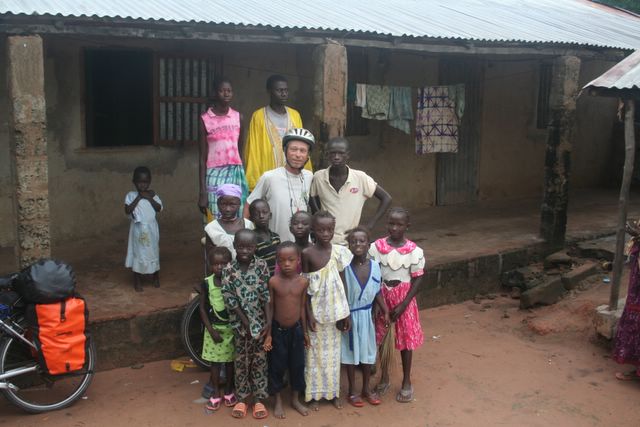 Nigerian
man selling his art in St. Louis and countless others who have worked
outside of their home countries, all hoping to better their situations.
One afternoon in Banjul Eric even ran into a young Gambian he had
met
a month back in Mauritania's northern city, Nouadhibou. The man
had come north looking for work and then got stuck toiling as fisherman
when his money ran out. He was hard up and couldn't afford the
trip back home. Fortunately for him, when election time in
the Gambia rolled around the president sent three buses up to
Mauritania to bring back the voters free of charge. These kinds of
chance encounters, rather than imposing monuments and temples, have
made the month memorable.
Nigerian
man selling his art in St. Louis and countless others who have worked
outside of their home countries, all hoping to better their situations.
One afternoon in Banjul Eric even ran into a young Gambian he had
met
a month back in Mauritania's northern city, Nouadhibou. The man
had come north looking for work and then got stuck toiling as fisherman
when his money ran out. He was hard up and couldn't afford the
trip back home. Fortunately for him, when election time in
the Gambia rolled around the president sent three buses up to
Mauritania to bring back the voters free of charge. These kinds of
chance encounters, rather than imposing monuments and temples, have
made the month memorable. Tomorrow we'll take to the road again and have a chance to brush up on our limited Portuguese as we spend a few days in Guinea Bissau. Then it will be on to Guinea where we hope to find more plentiful fruit and vegetables and also more strenuous cycling as we tackle the hills of the spectacular Fouta Djalon region. The roads there--often no more than dirt tracks--are said to be unpassable in the rainy season which is just winding down. Let's hope for dry weather!
